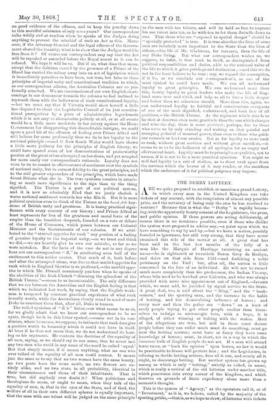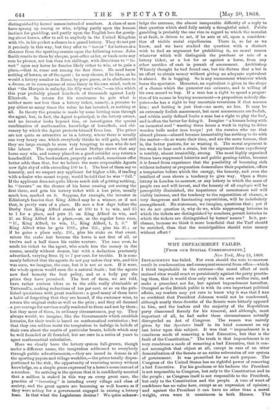THE DERBY LOTTERY.
ARE we quite prepared to establish or sanction a grand Lottery, in which every man in the United Kingdom can take tickets of any amount, with the temptation of almost any possible prize, and the certainty of losing only the stun he has resolved to venture? Because-that is what the " Derby " is rapidly becom- ing, with the apparently hearty consent of the Legislature, the press, and public opinion. If those powers are acting deliberately, of course there is no resistance possible, even if those who dislike the system were prepared to advise any,—a point upon which we have something to say by and by,—but we have a notion, possibly founded in ignorance, but still very strong, that they have never examined this side of the matter at all. A great deal has been said in the last few months of the folly of a man like the Marquis of Hastings tarnishing an ancient name—he is eighteenth or twentieth Baron Grey de Ruthyn, and dates on that side from 1324—and forfeiting a noble patrimony on the Turf ; but, after all, the nation is little concerned in the fate of an individual. Ile will not be ruined much more completely than his predecessor, the Indian Viceroy, whose bills used to be hawked over Calcutta, and who was always provided with some nice appointment out of Eugland,—favours which, we must add, he justified by signal service to the State. A great deal, too, is said about the "Ring," and the "book- makers," and the sporting man, and the increase in the habit of betting, and the demoralizing influence of horses ; and every now and then the police are " down " on a knot of seedy people trying to get other people seedier than them- selves to indulge in microscopic bets, with a hope, it is alleged, of either winning or bolting with the stakes. Most of the allegations are true, but still in these cases decent people before they can suffer much must do something, must go near the betting centres ; must have or fancy they have some knowledge of horses ; must, in short, act in a way in which the immense bulk of English people do not act. If a man will attend horse races, or "back his opinion" upon horses, no law it would be practicable to frame will prevent him ; and the Legislature, in refusing to decide betting actions, does all it can, and nearly all it ought, to discourage betting. But another system has grown up among us which is only "betting," strictly so called, in name, which is really a revival of the old lotteries under another title, which penetrates into every corner of the kingdom, and which deserves on grounds of State expediency alone more than a moment's thought.
This is the system of "Agency," as the operators call it, or of "Investment," as it is, we believe, called by the majority of the sporting public,—that is, as we hope to show, of lotteries with tickets
distinguished by horses' names instead of numbers. A class of men have sprung up among us who, relying partly upon the human instinct for gambling, and partly upon the English love for gossip- ing about horses, offer to sell to anybody in the United Kingdom with 10s. in his pocket a chance in a grand lottery. They do not put it precisely in this way, but they offer to " invest" for betters at a distance from the sporting centres upon the following terms. John Smith remits to them by cheque, post-office order, or bank-note any sum he pleases, not leas than ten shillings, with directions to " in- vest " upon any horse he fancies likely either to win, or to gain a place,—that is, come out among the first three. He need know nothing of horses, or of the agent ; he may choose, if he likes, as he would a lottery number in Rome, by pure guess, or in obedience to a dream, or in consequence of some fancy in his own mind, such as that "the Marquis is unlucky, his filly won't win,"—an idea which this year probably placed hundreds of thousands against Lady Elizabeth. In return for his remittance he gets what is neither more nor less than a lottery ticket, namely, a promise to pay either so many times the value he has invested, or nothing at all. In theory the promise is made by some betting man through the agent, but, in fact, the Agent is principal, is the lottery owner, and no investor looks beyond him, or investigates the quaint combination of mathematics, knowledge of horseflesh, and chi- canery by which the Agent protects himself from loss. The prizes are not quite as attractive as in a lottery, where there is usually one very heavy one, which everybody thinks he will gain, but still they are large enough to seem very tempting to men who do not like labour. The experience of recent Derbys shows that any horse may win, and money placed on a good outsider may return a hundredfold. The bookmakers, properly so called, sometimes offer better odds than that, but we believe the more responsible Agents now fight shy of odds exceeding 100 to 1. The best of them say so honestly, and we suspect any applicant for higher odds, if trading uith a dealer who meant to pay, would be told that he was "full." lithe applicant does not quite like so much risk of getting nothing, he "invests" on the chance of his horse coming out among the first three, and gets his lottery ticket with a less prize, usually much less, marked on it. Suppose, for example, the investor in Edinburgh fancies that King Alfred may be a winner, or if not that, is pretty sure of a place. He sees a few days before the Derby that King Alfred stands at 100 to 1 to win, and 25 to 1 for a place, and puts 1/. on King Alfred to win, and 1/. on King Alfred for a place,—or, as the regular form runs, "11., King Alfred, to win, 1/., King Alfred, 1, 2, 3." If King Alfred wins he gets 1001., plus 251., plus his 21.; or if he gains a place only, 251., plus his stake on that event, minus the stake lost because the horse is not first of all, or twelve and a half times his entire venture. The race over, he sends his ticket to the agent, who sends him the money in due course, usually without demur, but with a deduction previously advertised, varying from 21 to 7 per cent. for trouble. It is com- monly believed that the agents do not pay unless they win, and this was once, we imagine, the case, but it is not so now. If it were, -the whole system would soon die a natural death ; but the agents now find honesty the best policy, and as a body pay the prizes they have promised. The best of them, we are told, have rather curious ideas as to the odds really obtainable at Tattersall's, making reductions of ten per cent, or so on the pub-
lished quotations with great readiness ; a good many of them have a habit of forgetting that they are bound, if the customer wins, to return the original stake as well as the prize ; and they all demand . a per-centage for services really rendered to them and not by them ; but they most of them, in ordinary circumstances, pay up. They always would, we imagine, like the Governments which establish lotteries, for their trade is based on mathematical certainties ; but that they can seldom resist the temptation to indulge in beliefs of their own about the merits of particular beasts, beliefs which may be well founded or ill founded, but are sure in a series of years to upset mathematical calculation.
Here we clearly have the lottery system full-grown, though under a different name, the temptation addressed to everybody through public advertisements,—they are issued in dozens in all the sporting papers and village weeklies,—the prizes totally dispro- portioned to the risk, the opportunity of venturing money without knowledge, on a simple guess expressed by a horse's name instead of a number. So enticing is the system that it is confidently asserted that a million is staked in this way on every great race, the practice of "investing" is invading every village and class of -society, and the great agents are becoming as well known as if they were acting for a government engaged in raising a lottery loan. Is that what the Legislature desires ? We quite acknow-
ledge the extreme, the almost insuperable difficulty of a reply to that question which shall fully satisfy a thoughtful mind. Public gambling is probably the one vice in regard to which the moralist is at fault, is driven to act, if he acts at all, upon a considera- tion of visible social expediencies. There is, so far as we know, and we have studied the question with a distinct wish to find an argument for prohibiting it, no moral reason whatever which will distinguish the purchase or sale of a lottery ticket, or a bet for or against a horse, from any other sacrifice of cash in pursuit of amusement. Archbishop Whately thought he had found one, but his dictum that a bet is an effort to obtain money without giving an adequate equivalent is absurd. So is begging. So is any amusement whatever which bores the spectator. Moreover, an equivalent is given in the shape of a chance which the gamester can estimate, and is willing of his own accord to buy. If a man has a right to spend a propor- tion of his means in buying amusement—a proposition nobody dis- putes—he has a right to buy uncertain reversions if that amuses him ; and betting is just that—no more, no less. It may be an extremely foolish amusement, but most amusements are foolish, and within easily defined limits a man has a right to play the fool, and is often the better for doing it. Imagine "a human being with an immortal soul" wasting three hours a week in trying to drive wooden balls under iron hoops ! yet the curates who use that absurd phrase—absurd because immortality has nothing to do with the matter—do so waste their time, and are the more human, that is, the better pastors, for so wasting it. The moral argument is too weak to bear such a strain, but the argument from expediency is terribly, almost irresistibly, strong. The most highly organized States have suppressed lotteries and public gaming-tables, because it is found from experience that the possibility of becoming rich without industry or preparation demoralizes their population, offers a temptation before which the energy, the honesty, and even the intellect of men shows a tendency to give way. Open a State lottery in London to-morrow, or any lottery in which the mass of people can and will invest, and the honesty of all employis will be perceptibly diminished, the impatience of monotonous toil will visibly increase, and the tendency to the superstition of chance, a very dangerous and fascinating superstition, will be indefinitely strengthened. No statesman, we imagine, questions that ; yet if we do not question it, why do we, while suppressing lotteries in which the tickets are distinguished by numbers, permit lotteries in which the tickets are distinguished by horses' names ? Is it, per- chance, because we think it more beneficial that the Turf should be enriched, than that the municipalities should raise money without effort ?































 Previous page
Previous page